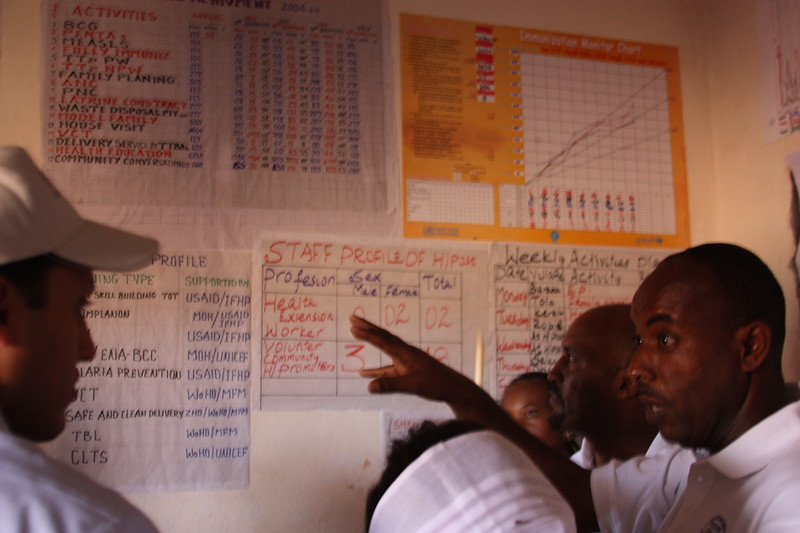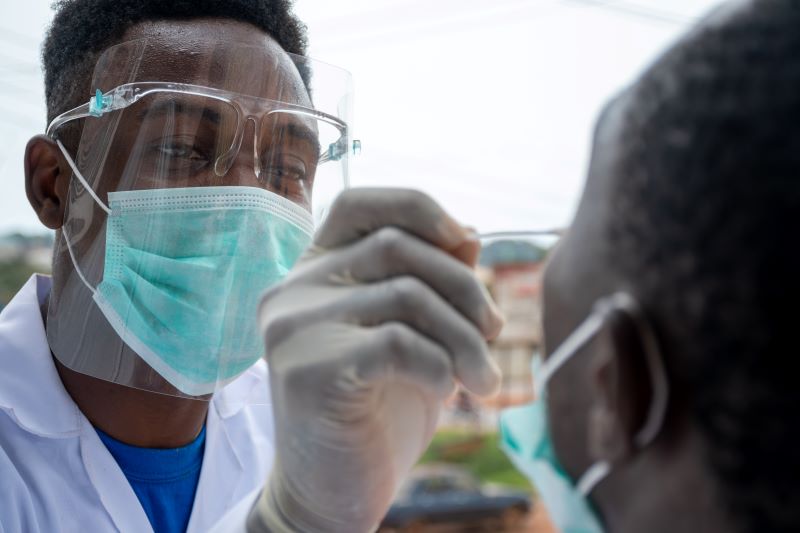Recommended

Blog Post

Blog Post
2023 was an important year for public health in Africa and a busy year for Africa CDC. Most notably, last year saw Africa CDC take steps in effecting its status as an autonomous institution of the African Union (AU), which ushered in greater operational independence, a more robust governance structure with the inclusion of a Committee of Heads of State and Government, an expanded membership of its governing board, and the additional mandate of declaring public health emergencies of continental security. Furthermore, 2023 marked the appointment of the first Director-General of Africa CDC for a four-year term.
In this blog, we detail four notable areas of work of the Africa CDC in 2023 and propose four areas of focus for 2024.
1. Operationalisation of Africa CDC
This past year witnessed the official inauguration of Africa CDC’s new headquarters at the African village in Addis Ababa, with the subsequent unveiling of the Biosafety Level Three (BSL3) reference laboratory within the headquarters’ complex. Africa CDC’s second strategic plan (2023–2027) was launched, outlining six programmatic priority areas and seven cross-cutting enablers to achieve the institution’s mission and vision (Figure 1).
Figure 1. Africa CDC strategic plan with priorities and enablers
In support of Africa CDC’s greater autonomy and expanded mandate, the AU Executive Council approved to increase the number of regular positions from 65 to 155. Among these, nine director-level positions and multiple professional and technical-level positions were introduced, which are currently being recruited. The revised organisational structure introduced five centres specialising in specific public health programmes and functions at the secretariat.
The institution’s highest governing body is now a committee comprising ten AU Heads of State and Government, along with the chairperson of the African Union Commission; five members of the AU Bureau of Heads of State and Government, and five representing the five AU regions. Africa CDC’s Governing Board membership has also expanded from 15 to 19, consisting of ten Ministers of Health who are also voting members together with representatives of the AU Commission, civil society, and the private sector. The Board elected Zambia and Ethiopia as its chair and co-chair. A 20-member technical advisory council has also been established to provide strategic recommendations to the Governing Board and the Secretariat of the Africa CDC.
Figure 2. Africa CDC’s Governance Structure as per the statute
2. Multi-country outbreaks and response
Throughout 2023, Africa CDC remained on high alert as outbreaks and public health incidents continued to occur regularly, with Africa CDC's surveillance system recording 166 public health events. In 2023, the African continent grappled with severe, widespread, and persistent cholera outbreaks, the first-ever Marburg virus disease outbreaks in Equatorial Guinea and Tanzania, the ongoing mpox virus outbreak, recurrent diphtheria outbreaks; multi-country anthrax outbreaks; the expanding burden of dengue and other arboviral diseases; emerging threats of malaria drug resistance, natural disasters, and infectious diseases aggravated by climate change. While going through the organisational transitions, Africa CDC supported member states in detecting, reporting, and responding to public health emergencies throughout the year.
Over the years, Africa CDC has developed extensive experience and expertise to support member states in planning for and responding to infectious disease outbreaks, including strengthening laboratory diagnostic and genomics capacity, enhanced surveillance, workforce development, data systems, outbreak detection, characterisation, investigations, and response.
3. A pursuit of self-reliance
Strengthening local manufacturing of health commodities remained high on Africa CDC’s 2023 agenda, including hosting the Partnerships for African Vaccine Manufacturing (PAVM) Forum and introducing the vaccine R&D and vaccine manufacturing competency frameworks. Just before the end of the year, Africa CDC welcomed the opening of the mRNA-based vaccines manufacturing plant in Rwanda and the announcement from Gavi on the creation of the African Vaccine Manufacturing Accelerator (AVMA), a funding mechanism of one billion USD designed to establish a viable vaccine manufacturing industry in Africa.
Furthermore, Africa CDC inaugurated key leadership and fellowship programs, including the Ministerial Executive Leadership Programme (MELP), the Public Health Emergency Management Fellowship, the Pathogen Genomics and Bioinformatics fellowship programme, and the African Epidemic Services (AES), as per its commitment to strengthening public health leadership and workforce development throughout the continent. Africa CDC also graduated the second cohort of the Kofi Annan Global Health Leadership Programme.
4. Towards localisation and fostering respectful and action-oriented partnerships
Africa CDC is actively working to shift the global health dialogue to take place within Africa itself. In the final quarter of 2023, Africa CDC hosted the third Conference of Public Health in Africa (CPHIA) in Lusaka, Zambia, with over 5000 in-person attendees. This was nearly double the number of participants compared to the second CPHIA, marking a significant leap in engagement and recognition of Africa's new public health order.
This past year has also seen Africa CDC forge vital partnerships with various stakeholders. These include a five-year Joint Emergency Preparedness and Response Action Plan (JEAP) with the World Health Organization, the second phase of the Saving Lives and Livelihoods Initiative with the Mastercard Foundation, and a memorandum of understandings and joint action plans with key partners, including Gavi, and the governments of the U.S. and France.
Africa CDC is still a nascent institution grappling with complex challenges
Notwithstanding its achievements, Africa CDC is still a young institution grappling with complex challenges. The institution's financial security is a critical challenge as it works to ensure operational stability and sustainable funding. This past year, Africa CDC was not able to meet the increasing needs of member states to effectively respond to outbreaks nor was it able to implement programmes to strengthen public health systems sufficiently. The expanded organisational mandate, structure, and the newly inaugurated headquarters, with a BSL-3 reference laboratory, also introduced the need for additional financing to optimally run the institution.
Job security for most of its short-term employees—who are seconded and linked to different grants and projects to support the COVID-19 response—remains a critical concern. Furthermore, the dynamic environment of rapid institutional change has fostered a sense of uncertainty among the staff as they strive to adapt to evolving circumstances and mandates.
Additionally, Africa CDC must navigate the multiple competing priorities as member states and other stakeholders look to the institution to address various public health challenges across the continent. In the same vein, during periods of "normalcy," Africa CDC must continue to build on the momentum and garner high-level engagement from the political leadership and development partners that was created at the peak of the COVID-19 pandemic.
As we embark on this new year, building on previous achievements and addressing these challenges will be pivotal in Africa CDC's continued growth and effectiveness in delivering its mandate. With this in mind, we highlight four areas of focus in 2024.
1. Prioritise and plan better
Africa CDC has a broad mandate to tackle a range of public health issues throughout the continent but with limited resources. Therefore, it must establish core priorities and flagships targeted at improving emergency preparedness, prevention, detection, and response. More than ever before, Africa CDC needs to consider when and how to do better things, including identifying emerging opportunities and discovering gaps in accordance with the primary purpose of its existence. Easier said than done, strategic prioritization to determine where to allocate resources, time, and effort most effectively is fundamental to organisational success. Africa CDC is familiar with managing changes and champions evidence-informed innovation and institutional evolution. Given the complex public health issues, demands, and resource limitations, it needs to be adept in determining what matters, resetting expectations, and saying "no" when merited.
2. Accelerate actions
The rapidly increasing outbreaks and public health threats require the Africa CDC to be an ever more agile institution that can make decisions and take timely, targeted, and adaptive actions to rapidly changing circumstances. The Africa CDC's new strategic plan (2023–2027) addresses Africa's critical and complex public health challenges. However, it needs to be effectively and rapidly translated into action. Strengthening its technical expertise through staff retention, development, and attracting talent; expanded partnerships and resource mobilisation; advocacy for increased funding for health by member states; increased and flexible financing through innovative mechanisms like the Africa Epidemics Fund are urgently needed. Furthermore, as Africa CDC expands and develops, the institution needs to be safeguarded against the potential growth of excessive bureaucracy, striking a balance between efficient operations and the necessary checks and balances. Now is a critical time for the Africa CDC to accelerate the implementation of actions incorporating the lessons from previous outbreaks and the COVID-19 pandemic.
3. Measure, Monitor and Adjust
“What doesn’t get measured doesn’t get improved.” Africa CDC should establish clear, comprehensive, specific performance indicators aligned with the organisation's strategic goals. Monitoring and evaluation capacities should be strengthened to assess the effectiveness of its programmes and initiatives and maintain ongoing scrutiny of these metrics to ensure that progress is maintained and lessons are learned.
4. Communicate better
Effective and consistent communication is crucial both internally and externally during periods of rapid transition, like the one that the Africa CDC is currently experiencing. Developing a comprehensive communication strategy that promotes transparency and interaction with all stakeholders is crucial to gauge their perceptions, gather valuable feedback, and make necessary adjustments. Furthermore, acknowledging that change has personal dimensions, especially for most of the Africa CDC's short-term employees, whose job security relies on project continuity, is essential to address the emotional impact and manage expectations.
Conclusion
As we welcome 2024, the Africa CDC is preparing to commemorate its seventh anniversary on 31st January, along with its second year of autonomy in February 2024. To ensure its continued success, Africa CDC must embrace the lessons learned, maintain a steadfast commitment to its mission, and take bold and purposeful actions to ensure the continent's health security. “Rome was not built in a day”; change takes time and effort. A stronger Africa CDC requires a strategic approach that combines bold vision, clear prioritisation, effective communication, and diligent monitoring to ensure the institution is well-positioned to fulfil its mission in the year ahead.
Disclaimer
CGD blog posts reflect the views of the authors, drawing on prior research and experience in their areas of expertise. CGD is a nonpartisan, independent organization and does not take institutional positions.







